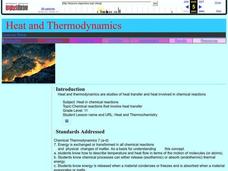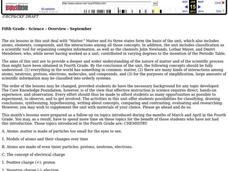National Institute of Open Schooling
Mole Concept
Learners explore atomic measurement in the first activity in a series of 36. Through readings, activities, and questions, classes review standard SI units, learn about Avogadro's constant, and use it to help them calculate moles. They...
National Institute of Open Schooling
Solid State
Crystal comes from a Greek word meaning ice. Activity eight in a series of 36 has class members analyzing amorphous and crystalline solids and further classifying them based on their forces. They then explore solids, learning about unit...
Curated OER
The Mole
In this moles worksheet, students read about mole and learn how to calculate the number of moles in specific mass of compounds. This worksheet has 14 problems to solve.
Curated OER
Science Multiple Choice Words Worksheets
In this science activity, students choose the multiple choice science term that best matches the 15 definitions stated. Students circle their answers.
Curated OER
States of Matter
In this states of matter worksheet, students are given 15 statements and they fill in the blank with terms related to solids, liquids and gases and the transition from one state to another. Students use the clues to complete a crossword...
Curated OER
Chemistry of Food
In this chemistry of food worksheet, students complete 20 various types of questions related to food and nutrition. First, they complete a crossword puzzle with vocabulary terms. Then, students use the figure shown to write the...
Curated OER
Chemistry of Carbon: Building Blocks of Life
After giving basic details about the properties of Carbon, some of the common functional groups and molecules are featured. There are some details about specific functions and impact on the human body. The diagrams are helpful and could...
Curated OER
The Mole Concept
The need for a counting unit is mentioned as you introduce the mole to your young chemists. Use this presentation to explain Avogadro's number and describe the incredible quantity it represents. Lecture notes are included for most of the...
Cornell University
Splitting Water with Electricity
Explore how electricity splits water molecules into hydrogen and oxygen. Learners begin by calculating the voltage necessary to separate the water. They then perform the experiment and measure the ratio of hydrogen and oxygen bubbles.
Teach Engineering
Engineering and the Periodic Table
Elements, to the rescue! Scholars first review the periodic table, and then learn about the first 20 elements and their properties and uses in the fourth of six lessons in the Mixtures and Solutions unit. Applying their newfound...
Teach Engineering
Active and Passive Transport: Red Rover Send Particles Over
I can move about freely, but you cannot. The class models the movement through cell membranes by way of passive and active transport. Members of the class play the roles of various proteins, atoms, compounds, and cell actions and mimic...
Texas State Energy Conservation Office
Global Climate Change
Here is an extensive reading resource that addresses our climate change crisis. It thoroughly explains the greenhouse effect, related Earth cycles, and the history of climate change. Use it as part of the intended unit, published by the...
Curated OER
Heat and Thermodynamics
This is actually a 10-day mini unit on thermal energy for your high school chemists. Every avenue is taken to get learners absorbed in heat: a pretest, a PowerPoint presentation, Internet exploration, demonstrations, lab activities, and...
Curated OER
Matter And Its Changes
Fifth graders explore the phases of matter, make observations of matter, the physical and chemical properties of matter, solutions and mixtures, formation of molecules and atoms and molecules all through hands on activities.
Curated OER
Holy Moley!
For this chemistry worksheet, learners calculate to find the molar mass of water. Then they identify how many moles of hydrogen atoms and oxygen atoms they would have in a beaker. Students also write the chemical formula of cholesterol.
Curated OER
Catering Middle-School Science: Monomers, Polymers, and Macromolecules
Students investigate foods. In this biology lesson plan, students will conduct testing on different types of foods as they learn about different molecules that make them up. Students will also learn about the shapes of the molecules.
Curated OER
Chemical Formulas Unit-Day 4
The purpose of this lesson plan involves reviewing nomenclature and molecular
formulas as well as introducing naming molecular compounds and identifying acids. The students investigate and understand how conservation of energy
and matter...
Curated OER
The Mole
This compact collection of slides explains the history and use of the mole unit. Relative atomic mass, as John Dalton understood it, is explained. Avogadro's number is also introduced. The mole, or the unit for the amount of a substance,...
University City High School
Metabolism Lesson Plan
Not a lesson plan in the traditional sense, this is a collection of resources with which you can craft a lesson plan on metabolic processes. It includes an outline of topics, some brief discussion, and a large array of animations,...
Curated OER
Moles Worksheet
In this chemistry worksheet, students identify and write how many significant figures they would use for each problem. Then they round the answers to the appropriate number of significant figures. Finally, students calculate the mass of...
Curated OER
Matter Unit
Students create products from studying about matter that include: Make a "T" chart with matter and non matter items. Write a poem, song, or rap about matter. Five vocabulary words from the chapter must be included in the poem.
Curated OER
Matter
Fifth graders investigate the nature of matter and of the scientific processes associated with them in this series of lessons.
Curated OER
Unit 5- Oxidation Reduction
In this oxidation reduction worksheet, students read the notes provided about the different types of chemical reactions. Students identify the reactants and products and answer fill in the blank and short answer questions.
Curated OER
Chemistry Unit on Compounds, Formulas, and Equations
Students perform a review assignment in 3 portions to review chemistry compounds, formulas, and equations. The assignment consists of several different portions that can be used as assessments. The majority of the lesson plan is composed...

























